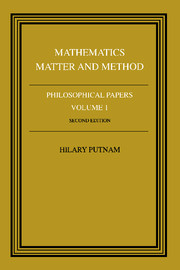Book contents
- Frontmatter
- Contents
- Dedication
- Introduction
- 1 Truth and necessity in mathematics
- 2 The thesis that mathematics is logic
- 3 Mathematics without foundations
- 4 What is mathematical truth?
- 5 Philosophy of physics
- 6 An examination of Grünbaum's philosophy of geometry
- 7 A philosopher looks at quantum mechanics
- 8 Discussion: comments on comments on comments: a reply to Margenau and Wigner
- 9 Three-valued logic
- 10 The logic of quantum mechanics
- 11 Time and physical geometry
- 12 Memo on ‘conventionalism’
- 13 What theories are not
- 14 Craig's theorem
- 15 It ain't necessarily so
- 16 The ‘corroboration’ of theories
- 17 ‘Degree of confirmation’ and inductive logic
- 18 Probability and confirmation
- 19 On properties
- 20 Philosophy of Logic
- Bibliography
- Index
17 - ‘Degree of confirmation’ and inductive logic
Published online by Cambridge University Press: 04 August 2010
- Frontmatter
- Contents
- Dedication
- Introduction
- 1 Truth and necessity in mathematics
- 2 The thesis that mathematics is logic
- 3 Mathematics without foundations
- 4 What is mathematical truth?
- 5 Philosophy of physics
- 6 An examination of Grünbaum's philosophy of geometry
- 7 A philosopher looks at quantum mechanics
- 8 Discussion: comments on comments on comments: a reply to Margenau and Wigner
- 9 Three-valued logic
- 10 The logic of quantum mechanics
- 11 Time and physical geometry
- 12 Memo on ‘conventionalism’
- 13 What theories are not
- 14 Craig's theorem
- 15 It ain't necessarily so
- 16 The ‘corroboration’ of theories
- 17 ‘Degree of confirmation’ and inductive logic
- 18 Probability and confirmation
- 19 On properties
- 20 Philosophy of Logic
- Bibliography
- Index
Summary
Carnap's attempt to construct a symbolic inductive logic, fits into two major concerns of empiricist philosophy. On the one hand, there is the traditional concern with the formulation of Canons of Induction; on the other hand, there is the distinctively Carnapian concern with providing a formal reconstruction of the language of science as a whole, and with providing precise meanings for the basic terms used in methodology.
Of the importance of continuing to search for a more precise statement of the inductive techniques used in science, I do not need to be convinced; this is a problem which today occupies mathematical statisticians at least as much as philosophers.
But this general search need not be identified with the particular project of defining a quantitative concept of ‘degree of confirmation’. I shall argue that this last project is misguided.
Such a negative conclusion needs more to support it than ‘intuition’; or even than plausible arguments based on the methodology of the developed sciences (as the major features of that method may appear evident to one). Intuitive considerations and plausible argument might lead one to the conclusion that it would not be a good investment to spend ones own time trying to ‘extend the definition of degree of confirmation’ it could hardly justify trying to, say, convince Carnap that this particular project should be abandoned. But that is what I shall try to do here: I shall argue that one can show that no definition of degree of confirmation can be adequate or can attain what any reasonably good inductive judge might attain without using such a concept.
- Type
- Chapter
- Information
- Mathematics, Matter and MethodPhilosophical Papers, pp. 270 - 292Publisher: Cambridge University PressPrint publication year: 1979
- 5
- Cited by



